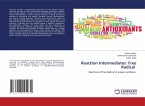High Quality Content by WIKIPEDIA articles! In chemistry, radicals (often referred to as free radicals) are atoms, molecules, or ions with unpaired electrons on an open shell configuration. The unpaired electrons cause them to be highly chemically reactive. Radicals play an important role in combustion, atmospheric chemistry, polymerization, plasma chemistry, biochemistry, and many other chemical processes, including human physiology. For example, superoxide and nitric oxide regulate many biological processes, such as controlling vascular tone. "Radical" and "free radical" are frequently used interchangeably, although a radical may be trapped within a solvent cage or be otherwise bound. The first organic free radical identified was triphenylmethyl radical, by Moses Gomberg in 1900 at the University of Michigan.
Bitte wählen Sie Ihr Anliegen aus.
Rechnungen
Retourenschein anfordern
Bestellstatus
Storno








